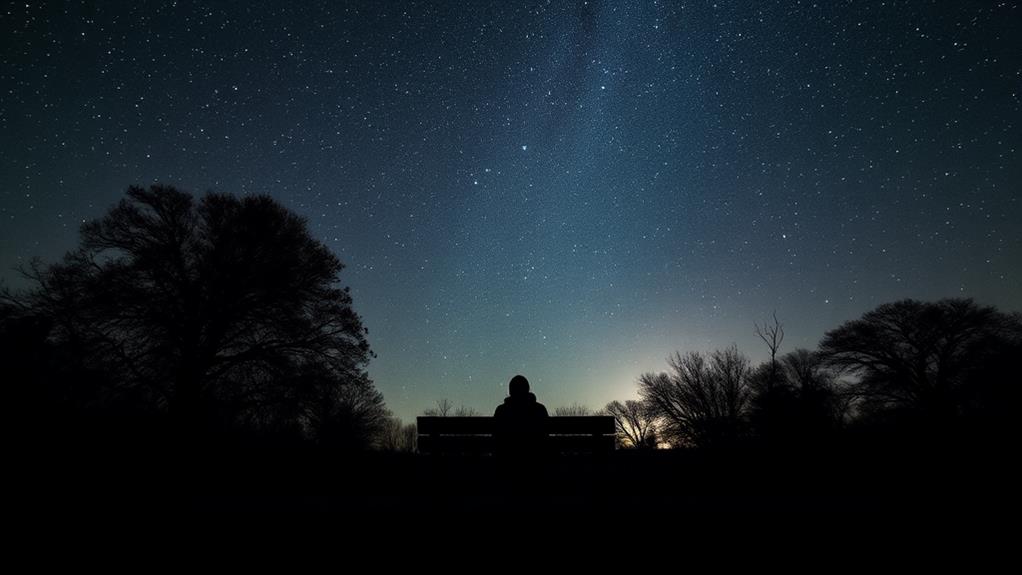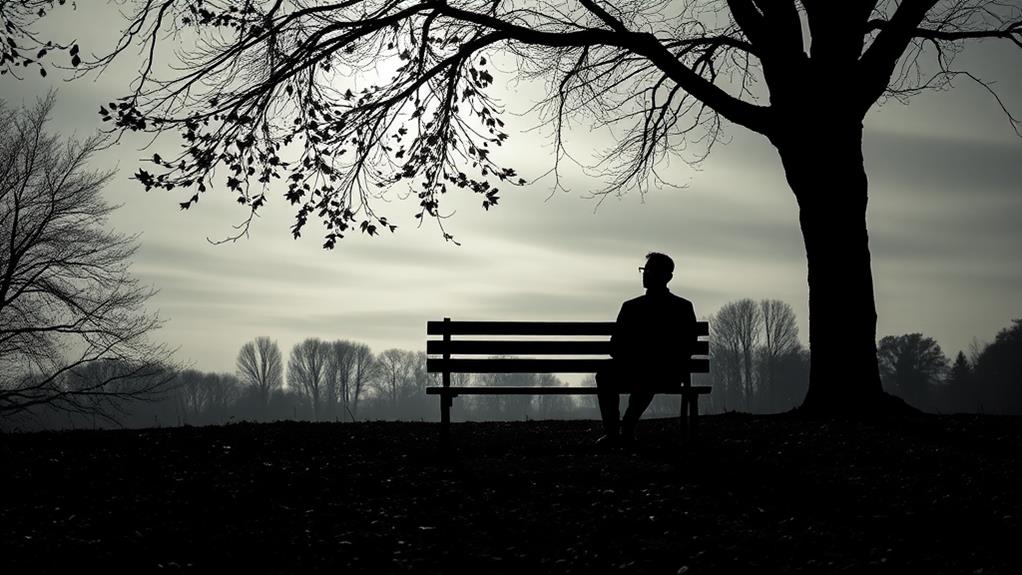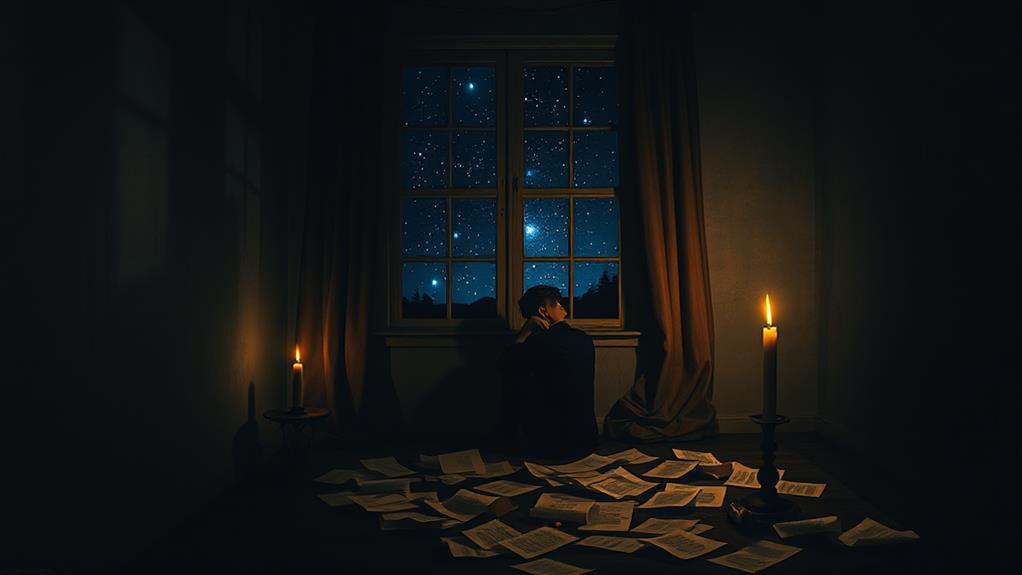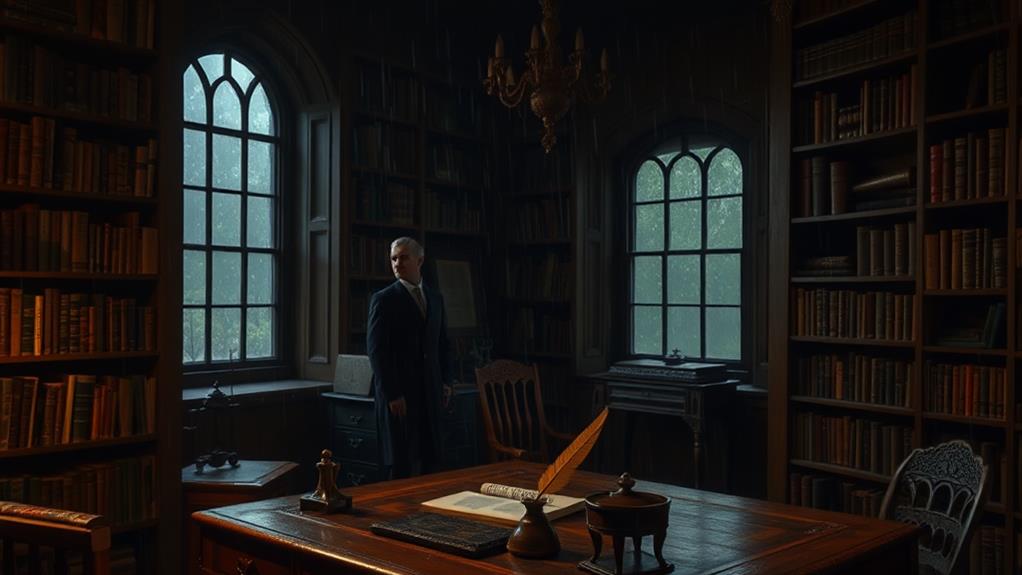When you think about loneliness, you might picture a quiet room or a solitary walk through nature, but poetry captures these moments in ways that words alone often can't. The voices of poets, both classic and contemporary, explore the intricate layers of solitude and its emotional weight. They invite you to reflect on your own experiences, sparking connections you might not have anticipated. As you consider these poignant expressions, you'll find that each poem reveals a deeper truth about isolation that resonates beyond the page. What insights might you uncover as you explore this powerful theme?
Understanding Loneliness in Poetry

Loneliness in poetry often serves as a mirror, reflecting the depths of human emotion and experience. When you read a poem about loneliness, you might feel the weight of the words, almost like a cozy blanket that wraps around you. It's a way for poets to share their feelings, letting you know you're not alone in your thoughts.
Poets use imagery and metaphors to paint a picture of solitude. You might find yourself imagining a dark, empty room or a quiet forest where the only sounds are your own thoughts. These images help you connect with the emotions expressed.
Sometimes, poets even sprinkle in a touch of humor to remind you that loneliness can be a little silly, too.
As you immerse yourself in these poems, pay attention to how they make you feel. Do they bring a sense of comfort, or do they hit a nerve? Each poem offers a unique exploration of loneliness, inviting you to reflect on your own experiences.
Classic Poems on Solitude
Poetry has a rich tradition of exploring solitude, with classic works offering profound insights into the human experience. When you read poems from great poets like Emily Dickinson or John Keats, you'll notice how they capture feelings of being alone.
Dickinson often wrote about her own solitude, using nature as a backdrop to express her emotions. You can picture the quietness of her garden, where she found peace and reflection.
On the other hand, Keats dives into the beauty and pain of being alone. In his famous "Ode to a Nightingale," you can feel his longing for connection, while still appreciating the serenity of solitude.
These poets remind us that being alone doesn't always mean being lonely. Sometimes, it's a chance to think, dream, and even create!
As you explore these classic poems, you might find a sense of comfort in their words. They show that solitude can be a friend rather than a foe.
Contemporary Voices on Isolation

In today's world, many poets capture the raw essence of isolation through their contemporary works. You might find these poems relatable, especially when they express feelings you've experienced.
Poets like Ocean Vuong and Rupi Kaur dive deep into loneliness, revealing how it can feel both heavy and strangely comforting. They explore moments when you feel like the only person in a crowded room, or when silence becomes your closest friend.
You can see how these poets use simple, yet powerful language to connect with readers. They share personal stories that resonate with you, making you feel understood. It's like they're saying, "Hey, I get it. You're not alone!"
Some even sprinkle a bit of humor throughout their verses, lightening the mood. These modern voices remind you that isolation isn't just about being alone; it can also be a chance for self-discovery.
Nature Imagery in Loneliness
Nature often reflects the depth of loneliness in striking ways. Think about a vast, empty field, with nothing but tall grass swaying gently in the breeze. You can almost hear the whispers of the wind, reminding you of quiet moments spent alone.
Imagine standing by a still lake, where the water mirrors the sky, creating a sense of isolation. It's peaceful, but it also feels a bit lonely, doesn't it?
In poetry, nature imagery captures these feelings beautifully. A single tree standing tall on a hill can symbolize strength, yet its solitude can make it seem even more alone.
You might picture the moon shining brightly in a starless sky, casting shadows that stretch long and far, echoing the emptiness you sometimes feel.
These images remind you that loneliness isn't just a human experience; it's found in nature too. The soft rustle of leaves or the distant call of a lonely bird can resonate with your heart.
Emotional Depth in Solitary Poems

Delving into solitary poems reveals a profound emotional depth that resonates with anyone who's experienced isolation. When you read these poems, you might find yourself nodding along, feeling a connection to the writer's feelings. The words can hit you right in the heart, making you think about your own lonely moments.
These poems often explore feelings like sadness, longing, and even a bit of hope. It's like the poet is holding up a mirror, showing you that you're not alone in your feelings. You might laugh a little, too, as you recognize the quirks of solitude—like talking to your pet or finding joy in a rainy day.
Solitary poems can also remind you that isolation isn't always a bad thing. Sometimes, it's a chance to reflect, grow, and even enjoy your own company.
Cultural Perspectives on Solitude
On the flip side, in some Western cultures, being alone can sometimes feel lonely or even awkward.
You might hear people say, "Don't be a loner!" This idea can make solitude seem like something to avoid.
Yet, in many Indigenous cultures, solitude is cherished. It's a time for connecting with nature and one's own spirit.
Notable Poets and Their Works

Many poets have explored the themes of loneliness and solitude, each bringing their unique perspectives and styles to the subject.
For instance, Emily Dickinson often wrote about her quiet life, capturing the essence of being alone. In her poem "I dwell in Possibility," she reflects on solitude as a space for imagination and creativity. You might find that comforting!
Then there's Robert Frost, who paints a picture of isolation in poems like "Stopping by Woods on a Snowy Evening." His imagery makes you feel like you're wandering through a peaceful but lonely winter landscape. It's like he knows how to make solitude feel both beautiful and a bit heavy at the same time.
Another great poet is Langston Hughes. His work often addresses loneliness through the lens of social issues. In "The Weary Blues," he shares a soulful experience that resonates with feelings of isolation.
Finding Comfort in Poetic Reflections
Poetry offers a unique refuge for those grappling with feelings of loneliness and solitude. When you immerse yourself in a poem, it's like opening a door to someone else's world. You might find words that mirror your own feelings, and suddenly, you're not alone. A poem can be a warm hug on a cold day or a friend who knows exactly what you're going through.
As you read, you discover that many poets have walked similar paths. They've felt lost, just like you. Their verses can wrap around you like a cozy blanket, helping you feel understood. When you connect with their words, you realize you're part of a larger story.
Poems can also inspire you to reflect on your own experiences. Maybe you'll grab a notebook and jot down your thoughts, or even write your own poem. Who knows? You might just uncover a talent for expressing your feelings.
